Timepass 2 est un film de genre Drame réalisé par Ravi Jadhav avec Priyadarshan Jadhav
Timepass 2 (2015)
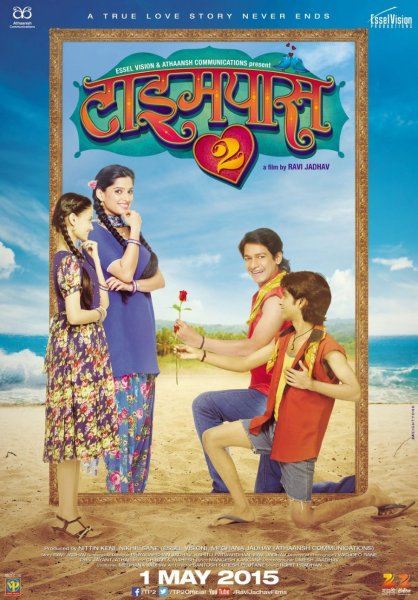
Si vous aimez ce film, faites-le savoir !
- Infos
- Casting
- Infos techniques
- Photos
- Vidéos
- Passages TV
- Citations
- Personnages
- Musique
- Récompenses
Timepass 2 (Marathi: टाईमपास २) is a 2015 Marathi film directed by Ravi Jadhav.It is the sequel for the 2014 film Timepass (film). It continues the incomplete lovestory of Dagadu (Rocky) and Prajakta (Praju) also starring Bhalchandra Kadam and Vaibhav Mangle. It is directed by Ravi Jadhav.
Synopsis
The story takes place after 15 years with grown up Dagadu (Priyadarshan Jadhav) and Praju (Priya Bapat). Young Dagadu (Prathamesh Parab) is a successful music company owner. Who has settled up himself, fulfilling his and his father's dream. Dagadu's Friend Bal Bharati is a successful astrologist, Kombda is now a DJ working with Dagadu's music company and Malaria has become a politician. The movie begins with a scene in which Dagadu donates an ambulance for the people in his area, reflecting his caring attitude. After the event, Dagadu's sister suggests him to marry, showing him photos of some girls, as a result, dagdu hesitates as he is still searching the love of his life. He gets to know that Prajakta (Priya Bapat) is in Kudal, Konkan.Acteurs

Priyadarshan Jadhav
(grown up Dagadu Parab.)

Priya Bapat
(grown up Prajakta Lele.)

Prathamesh Parab
(young Dagadu Parab.)

Ketaki Mategaonkar
(young Prajakta Lele.)

Vaibhav Mangle
(Prajakta's father Madhavrao Lele.)
Commentaires
Postez un commentaire :
Suggestions de films similaires à Timepass 2
Il y a 15 films ayant les mêmes acteurs, 4 films avec le même réalisateur, 68167 ayant les mêmes genres cinématographiques (dont 13412 ayant exactement les mêmes 2 genres que Timepass 2), pour avoir au final 70 suggestions de films similaires.Si vous avez aimé Timepass 2, vous aimerez sûrement les films similaires suivants :

Time Pass (2014)
Réalisé par Ravi Jadhav
Genres Comédie, Romance
Thèmes Musique
Acteurs Prathamesh Parab, Ketaki Mategaonkar, Prathamesh Parab, Vaibhav Mangle, Meghana Erande, Bhalchandra Kadam
Note74%






Balak Palak (2013)
, 1h49Réalisé par Ravi Jadhav
Genres Drame, Comédie
Thèmes Le thème de l'éducation, Films pour enfants
Acteurs Sai Tamhankar, Madan Deodhar, Prathamesh Parab, Prathamesh Parab, Kishor Kadam, Anand Abhyankar
Note80%





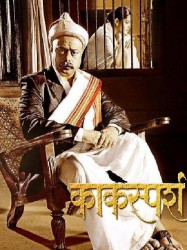
Kaksparsh (2012)
, 2h27Réalisé par Mahesh Manjrekar
Genres Drame
Thèmes Adaptation d'une pièce de théâtre
Acteurs Sachin Khedekar, Priya Bapat, Saksham Kulkarni, Ketaki Mategaonkar, Vaibhav Mangle, Manava Naik
Note79%





Hari Damle (Sachin Khedekar), head of a Chitpavan Bramhin family, lives in the village Torgaon in Konkan with his wife Tara (Medha Manjrekar), their three children, his younger brother Mahadev (Abhijit Kelkar), and his widowed aunt, Namu Aatya (Savita Malpekar). Hari arranges the marriage of Mahadev with a pre-pubescent girl, Durga (Ketaki Mategaonkar), renamed as Uma after marriage. However, Mahadev dies before the consummation of the marriage. Hari performs death rituals (Śrāddha) for Mahadev but crows (symbolic of the spirit of the deceased in Hinduism) refuse to touch the offerings. Hari mumbles something while offering food after which crow touches the offerings.

बालगंधर्व (2011)
, 2h4Réalisé par Ravi Jadhav
Genres Drame, Biographie
Acteurs Subodh Bhave, Vibhawari Deshpande, Suhas Joshi, Kishor Kadam, Anand Abhyankar, Rahul Deshpande
Note78%





The film is a biopic on life on Balgandharva showing his struggles through poverty to riches and fame. Narayan Rajhans while in a public performance of his singing at Pune receives his new honour and name "Balgandharva". On advise of Shahu Maharaj, the king of Kolhapur state, he starts his formal training and joins Kirloskar Natak Mandali. Narayan wins claps of his audiences and becomes the key performer of all Sangeet Nataks. To please his insistent mother Narayan marries Laxmi. On the opening day (March 12, 1911) of his play Sangeet Manapamaan, his infant daughter dies. But he goes ahead with the performance and enthralls the audience. Due to disputes in the company Narayan decides to start his own company named Gandharva Natak Mandali. Fully devoting himself towards his passion of drama and singing he overlooks his family. Giving audience's satisfaction key priority he starts spending money without any considerations. He loses many of his friends because of such attitude. He blindly believes in Balasaheb Pandit, who keeps his company's accounts. Narayan's carefree nature results in his bankruptcy. Meeting Gohar Bai, who is his fan, he falls in love with her and leaves his wife and family. With his old age, he also loses the charm of holding audiences. When cinema is introduced, theatre fails to grab audiences. Balgandharva also signs contract with V. Shantaram's Prabhat Film Company to act in films. Money in films would also reduce his economic burden. But he never likes the methodologies of film production and abandons it after only one film where he plays the lead role of Sant Eknath. Looking at his poverty many Royalties pay him honorary amounts in order to repay his debts. But he in turn donates this money to other charities.
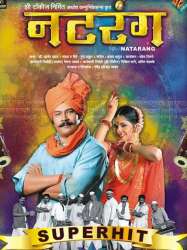
Natarang (2010)
, 2hRéalisé par Ravi Jadhav
Genres Drame, Musical
Thèmes La musique, Musique
Acteurs Atul Kulkarni, Sonalee Kulkarni, Sonali Kulkarni, Vibhawari Deshpande, Kishor Kadam, Amruta Khanvilkar
Note84%





Gunvantrao Kagalkar aka 'Guna' (Atul Kulkarni), a poor village labourer, nurtures an obsession for Tamasha - a popular theatrical folk art form of Maharashtra. Unforeseen circumstances lead him to lose his job as labourer and lands him in situation where he sets up a theatre company along with his friend and mentor Pandba (Kishor Kadam). Guna is convinced that his troupe cannot take off unless it has a female dancer. After painstaking search, Pandoba finds Naina (Sonalee Kulkarni), the daughter of his former lover Yamunabai (Priya Berde), who is willing to dance for the company on the condition that it has a "Nachya", a "pansy" character, a man who acts in an effeminate manner. As no one is willing to take up the role, due to the eunuch taboo, Guna takes it upon himself to play the character. The strongly built Guna takes up the challenge of doing the role due to his passion for the art.

Time Please (2013)
Genres Drame, Romance
Acteurs Priya Bapat, Siddarth Jadhav, Umesh Kamat, Sai Tamhankar
Note70%





Amruta, 24 is a bubbly girl who's married to Hrishi, 30, a matured man. She is lively and loud while he is composed and subtle. Just after the marriage they start to discover the differences between their liking, expressions and views. The real drama starts when Hrishi's colleague Radhika and Amruta's childhood buddy Himmatrao come in the picture.
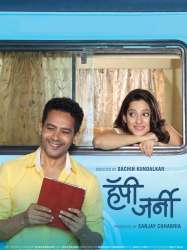
Happy Journey (2014)
, 2h9Réalisé par Sachin Kundalkar
Genres Drame, Comédie, Romance
Acteurs Atul Kulkarni, Priya Bapat, Pallavi Subhash
Note67%






Réalisé par Mahesh Manjrekar
Genres Drame
Acteurs Mahesh Manjrekar, Sachin Khedekar, Makarand Madhukar Anaspure, Siddarth Jadhav, Priya Bapat, Reema Lagoo
Note79%





Dinkar Maruti Bhonsle represents thousands of 'Marathis' who feel they have lost their identity in the cosmopolitan Mumbai. Dinkar feels Mumbai is in Maharashtra but there is no Maharashtra left in Mumbai. He always complains about the lack of respect a Marathi receives in Mumbai and feels he is victimized everywhere because he is a Marathi; little realizing that he himself has brought this situation upon himself.
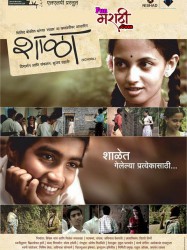
Shala (2011)
Genres Drame
Acteurs Anshuman Joshi, Ketaki Mategaonkar, Dilip Prabhavalkar, Santosh Juvekar, Jitendra Joshi, Amruta Khanvilkar
Note82%





Set in the 70’s in rural India, four 9th grade kids were writing their destiny. Joshi (14) is in love with Shirodkar (14), a beautiful girl. Both go to the same school, and study in the same class. faced with the age old question “What is love anyway?”, Joshi goes through a series of events just to let the girl know about his feelings towards her. Joshi’s friends on the other hand are going through the same phase of life. The difference is all four of them come from a different cultural and family background.

Touring Talkies (2013)
Réalisé par Gajendra Ahire
Genres Drame
Thèmes Film traitant du cinéma
Acteurs Subodh Bhave, Trupti Bhoir, Milind Shinde, Kishor Kadam, Neha Pendse, Vaibhav Mangle
Note74%





The movie is based on the concept of roaming cinema which was one of the oldest traditions in the bygone era of Indian cinema where the movies were showcased in tents for the local folks also known as Touring talkies. For the past few decades these films have made a common recurring occurrences in most of the Carnival Fun fair taking place across villages where the Marathi Cinema is adored in a completely distinctive fashion
 Connexion
Connexion